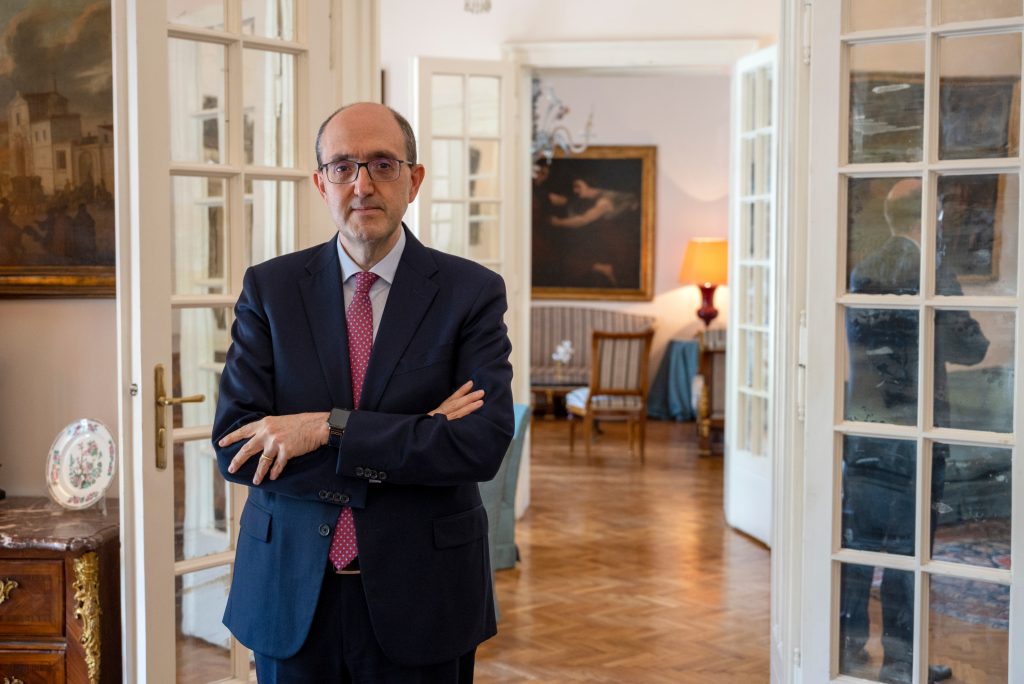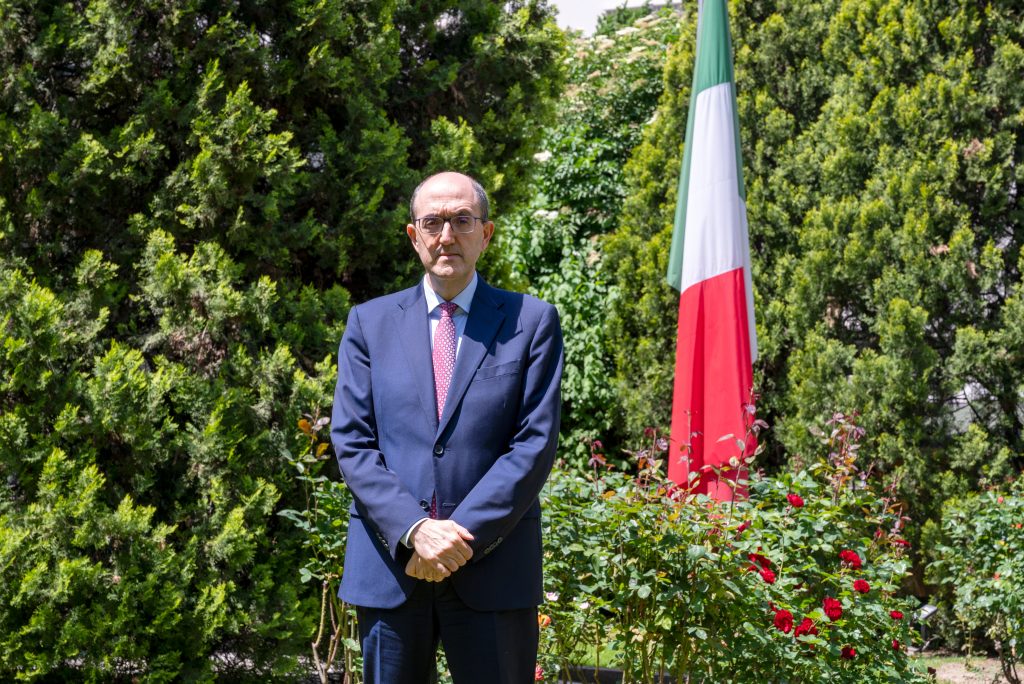The bilateral cooperation is based on a solid and ever growing Italian entrepreneurial presence. Our cooperation also develops within the framework of the EU being Italy a founding member, and Serbia a candidate state.
We spoke with Italian Ambassador to Serbia, Carlo Lo Cascio, about the relations between our two countries today, given that diplomatic relations date back to 1879 and Italian companies have been investing in Serbia for almost 20 years.

“For two countries bound by such a solid friendship, the exchange of visits between our Governments remains a consolidated tradition that has not changed even during the pandemic. Last year, in fact, two Ministers came from Rome to Belgrade, the Minister of Foreign Affairs and International Cooperation, Luigi Di Maio, and the Minister of Defense, Lorenzo Guerini, as well as former Deputy Minister for Foreign Affairs (and current Deputy Minister for Internal Affairs), Ivan Scalfarotto. For Serbia, former Minister of Foreign Affairs and current National Assembly President Ivica Dacic and the Minister of European Integration Jadranka Joksimovic paid a visit to Italy. This year, Minister of Foreign Affairs Nikola Selakovic went very recently to Rome, also”, he concluded.
I was truly moved by all the expressions of love and solidarity towards Italy from both Serbian citizens and authorities in the most difficult moments for our country last year
The relations between the two countries intensified during the COVID-induced crisis when Serbia sent aid to Italy. How important is it that our two countries help each other?
The relationship between Italy and Serbia is vibrant and sincere. The support received from the Serbian Government with the generous donations of sanitary protective devices one year ago, was a concrete sign of friendship for which I would like once again to thank Serbian people.
As I said many times, although I was well aware of the generosity of Serbian friends, I was truly moved by all the expressions of love and solidarity towards Italy from both Serbian citizens and authorities in the most difficult moments for our country last year.
The generous donation was an extraordinary expression that was deeply appreciated. In my opinion, the great solidarity movement from the Serbian population has confirmed, once again, that the friendship between Italy and Serbia is long-standing and genuine. The story of our relationship is truly a meeting of close partners who help each other.
Italy has been close to Serbia by sending last summer a Civil Protection medical team that came here with great enthusiasm and willingness to support and assist the Serbian people, as well as Serbian doctors, by sharing the experience made during the first most difficult months of the pandemic in Italy, in spring last year.
According to a study published in November last year, Italy is a very important external trade partner of Serbia. Is there room for the two countries to improve trade?
With around 600 Italian companies present in Serbia, the result achieved in bilateral trade last year was more than acceptable, considering the exceptional circumstances of the pandemics. Italy confirmed to be Serbia’s second trade partner with 3.4 billion euros in the commercial exchange.Indeed, there is room for improvement not only with statistics – that by the way show positive feedback already for the first quarter of this year – but also with a wider cooperation to be achieved with new investments.
In our perspective, innovation and high-tech in general offer the greatest potential for collaboration between our countries. New technologies can be successfully developed in sectors like digital infrastructure, healthcare and medicine, agriculture, industry, renewable energy, industry and others.
Moreover, scientific cooperation between Italy and Serbia has been increasingly intense in the last few years. I have personally attached special importance to cooperation in the field of science. In these last years, we focused also on “science diplomacy” and its link to industrial application and value-added manufacturing. Our two countries have both a long-standing tradition in science and research and could benefit a lot from this approach.

Italy supports Serbia on its EU accession path. How important do you think Serbia’s role is in the Western Balkans region?
The positive and fundamental role played by Serbia in the Western Balkans is demonstrated by the improvement in relations with neighboring countries in recent years and in itself by the intensification of regional cooperation, in particular with Albania and North Macedonia within the framework of the “Mini Schengen initiative’”. Belgrade’s willingness to supply vaccine doses to other countries in the region was also another important signal.
In this regard, we appreciate Serbia’s commitment to the EU-facilitated Dialogue with Pristina. An agreement would represent a historic turning point for the entire Region. We are aware of the obstacles that the negotiations are facing, but we count on the leadership of President Vucic to reach this important milestone which will certainly lead to immense benefits, by achieving progresses in parallel within the European accession process. Like Minister of Foreign Affairs Luigi Di Maio recently said, the goal of this historic result requires the utmost commitment on both sides.
In our view, without a serious and credible revitalization of the EU enlargement process, it is unlikely to definitively stabilise the Region. In this respect, we do not want to create “shortcuts” in the process of the EU enlargement to the Balkans or dilute the reforms. However, in the Western Balkans we must avoid the vicious circle of disillusion and skepticism feeding each other, where the absence of a concrete European perspective on the part of the EU slows down or stops the progress of reforms in the countries of the Region.
What reforms does Serbia need to implement to improve the business environment?
Serbia’s progress in economic reforms is remarkable. Macroeconomic stability has been largely achieved. This notwithstanding, structural reforms will be on the top of the agenda to put economy on a durable and sustainable path: better fiscal planning, fairer and more predictable business environment, competition laws and policies, increase in public investment, restructuring of public companies and fight against corruption.
Beyond that, more progress is needed in the wide area of rule of law, fundamental rights and good governance: approving and implementing the justice reform, delivering a comprehensive reform of the public administration, stepping up the fight against corruption and organized crime with a solid track record, creating an environment that fully guarantees freedom of expression, including implementation of the media strategy. The Serbian Government is working with renewed commitment on all these issues and we are confident that significant results could be soon achieved.
You recently met with President Vučić and the Serbian Minister of Defence, while Minister Selaković was on an official visit to Rome. How would you describe the cooperation with the Government of the Republic of Serbia and Serbian institutions?
I think that we have a very good cooperation from every point of view. In Rome, Minister Selaković met with our Minister of Foreign Affairs to lay the foundations for a closer collaboration between our diplomacies, in view of Belgrade’s accession to the EU.
In fact, this is just one example among the others of how our cooperation with Serbian Government and Institutions has intensified even more appropriately in the light of the important challenges that our countries are facing with the pandemic emergency still underway.
Could you tell us about cooperation between Italy and Serbia in education, art and culture?
Cooperation in overall cultural sector is long-standing and very intense. In the education field, Italian language is studied from the third year of elementary school up to the university degree and PhD level. Currently it is possible to detect around 40.000 persons that study Italian in Serbia. The Italian Cultural Institute of Belgrade also offers Italian language courses at all the CEFR levels and, I am very proud to say, due to the pandemic we managed to organized online courses that actually received a positive feedback.
Excellent bilateral cultural relationships cover practically all sectors: music, visual arts, theater, literature, fashion, design, publishing and cinema. The Italian Cultural Institute cooperates with the major Serbian cultural institutions, public and private, and takes part in all major cultural events and festivals in Belgrade, but also in Novi Sad, Nis, Kragujevac.
Two recent examples of initiatives that I really would like to mention are the exhibition “Dante Ipermoderno” that we presented to the Serbian public in April and May. Again in May Italy has been the host country of the Budi Festival of Pancevo, dedicated to the world of childhood, which this year has Pinocchio as its topic.
Let’s not forget that last year the exhibition “Roma Aeterna” remained open to the public in Novi Sad, despite the pandemic, to confirm that our cultural presence has been continuously a source of connection even in tough times.
I am delighted by Serbian nature
What kind of connection to Belgrade and Serbia do you feel and which Serbian customs do you particularly like?
I really admire the sense of family that still persists in this country, as well as in Italy. This is indeed one of the main aspects that we strongly have in common and that make us very close. Love for food and the joy of gathering together, like in “slava” tradition, is heartwarming opportunity and it has been an honor for me in the past to be invited to those family meetings by some friends. I admit I am delighted by Serbian nature but I especially like to reach Roman ruins in the various localities in Serbia to enjoy, even more closely, the origin and the legacy of our historical friendship.